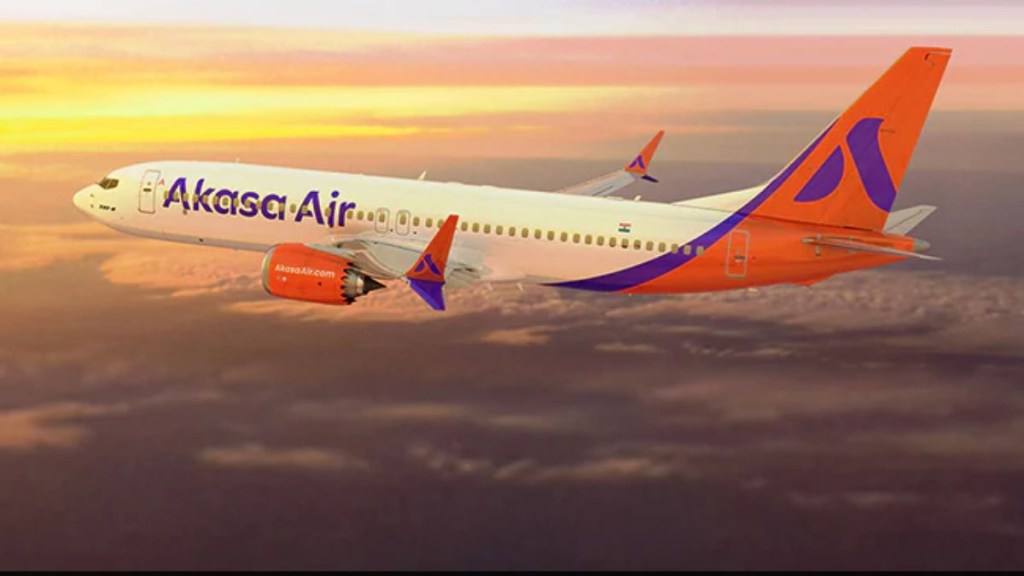Akasa Air, just over a year into its operations, is navigating a turbulent phase marked by the sudden resignation of over 40 pilots, leading to multiple flight cancellations. Despite these challenges, the airline’s Founder and CEO, Vinay Dube, asserts that Akasa Air remains financially robust and well-managed.
In a statement on Wednesday, Akasa Air said it is a well-run airline with strong finances. Vinay Dube, in a recent statement to the airline’s staff, urged them not to be swayed by media speculations of a potential shutdown and emphasised that the airline’s unwavering confidence in its future.
“I urge you not to be alarmed or distracted by media headlines, especially those that are speculative and claim that the airline will shut down. We are never more confident about our future and continue to invest prudently, with longer-term financial success in focus,” Akasa Air Founder and CEO told the staff yesterday.
Akasa Air has a plan to address pilot shortage
While addressing the pilot shortage, Dube pointed out that this is a longstanding issue within the aviation industry and stated that Akasa Air has a comprehensive ten-year plan in place, covering aspects such as pilot recruitment, training, and career development. As of now, the airline claims to have a sufficient number of pilots in various stages of training to operate over 30 aircraft.
Akasa Air sought DGCA’s intervention
The airline recently sought the Directorate General of Civil Aviation’s (DGCA) intervention to enforce mandatory notice periods for resigning pilots. The emerging airline has sought direction to the DGCA to “take coercive action against pilots who fail to comply with the mandatory notice period requirements, in terms of the Civil Aviation Requirement (CAR)…”.
Airline moves to Delhi and Mumbai High Courts
Furthermore, the airline is taking legal action in both Delhi and Mumbai High Courts regarding pilots resigning without fulfilling their notice period obligations. Dube emphasised that their actions not only breached their contracts but also contravened the civil aviation regulations of the country.
On Tuesday, Akasa Air informed the Delhi High Court that it is currently facing a “state of crisis” due to the “abrupt and unexpected” resignation of more than 40 pilots who departed the airline without complying with the mandatory notice period.
The airline has collaborated with DGCA to petition the Delhi High Court for the enforcement of an interim order related to the Civil Aviation Requirement (CAR) from August 16, 2017, which regulates pilots’ compliance with mandatory contract notice period requirements.
Additionally, Akasa Air has officially announced its legal action in the Bombay High Court to seek a stay against a limited number of pilots who resigned abruptly, leaving their positions without adhering to the obligatory six-month notice period. The airline highlighted that these pilots’ actions had caused significant inconvenience to passengers.
Akasa Air’s market share slides in August
In August, Akasa Air saw its domestic market share drop from 5.2 percent in July to 4.2 percent due to flight cancellations resulting from the pilot shortage. The airline carried 5.27 lakh passengers in August, a decrease from the 6.42 lakh passengers transported in July.
Over the past month, the airline strategically streamlined its network operations, opting to reduce flight frequencies and sacrifice short-term market share.
“The airline… has generated cash from its first day of operations as a result of which the initial investment by our investors (including the investment made by Mr Jhunjhunwala) continues to remain secure in our bank account… as an airline, we are adding to the company reserves even in the first year of our operations,” Dube noted.
Navigating through India’s complex aviation landscape
While the country’s aviation space is growing, some airlines are facing turbulence. Akasa Air is not alone in navigating the complex aviation landscape. Other carriers, such as Go First and SpiceJet, have encountered issues, while Jet Airways remains grounded due to unresolved disputes.
Go First, a budget carrier, had to halt its operations in May due to complications related to Pratt & Whitney (P&W) engines. Currently, the airline is in the midst of an insolvency resolution process. Meanwhile, SpiceJet is contending with significant financial challenges. In contrast, IndiGo and Air India are expanding their networks and operations.

